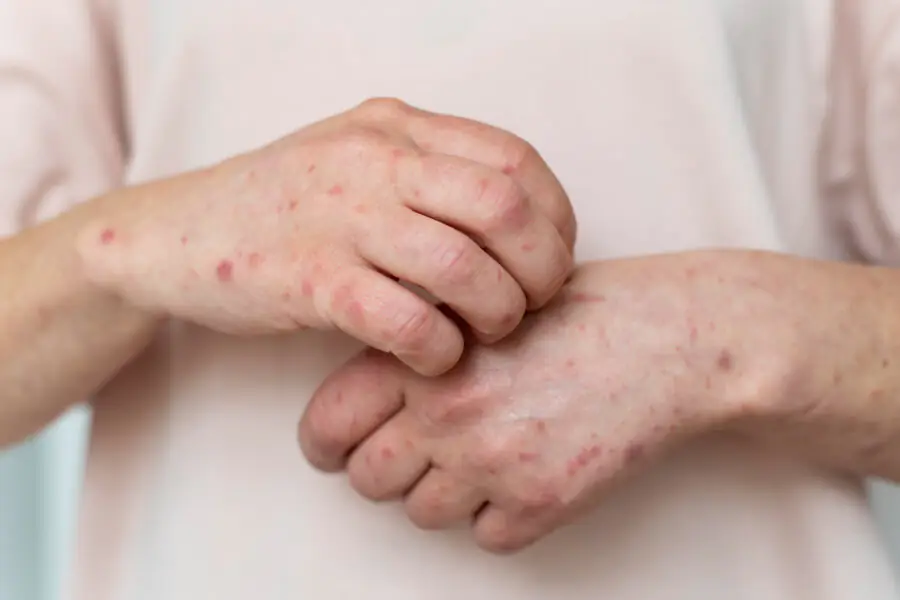When you experience persistent itching or a rash, it’s natural to wonder: “How do I identify scabies in comparison to allergies?”
Both conditions can cause skin irritation, but knowing the differences between them is important for receiving the proper treatment.
Learn how to identify scabies, compare them to allergic reactions, and explore the best treatment options for both.
How Scabies Distribute in your Skin?
Scabies is an infectious skin condition caused by a mite known as Sarcoptes scabiei. These tiny mites burrow under the skin, causing intense itching and discomfort.
To effectively identify scabies, it’s essential to know their key characteristics and how the mites spread.
Scabies Lifecycle
To identify scabies, understanding the lifecycle of the mites is important. The mites burrow into the skin to lay eggs.
The eggs hatch into larvae, which move to the surface to mature. This lifecycle continues, causing further irritation.
As the mites reproduce, they spread through skin-to-skin contact, which is why it’s important to know how to identify scabies early.
Types of Scabies: Common vs. Crusted Scabies
When you learn how to identify scabies, it’s important to note that there are two primary types: common scabies and crusted scabies.
Crusted scabies are rarer but more severe, often affecting individuals with weakened immune systems. It causes thick, scaly patches on the skin, which can be more difficult to identify at first.
Common Symptoms of Scabies
The first step in how to identify scabies is recognizing its symptoms. Key indicators include intense itching, especially at night, and a rash with small red bumps or blisters.
Scabies often result in raised, grayish lines on the skin, which are caused by the mites burrowing under the surface.
Differences Between Scabies Symptoms and Allergic Reactions
If you’re trying to identify scabies, it’s important to note that while scabies and allergies both cause itching and rashes, they differ in several ways.
Scabies typically cause localized, persistent symptoms, whereas allergic reactions often spread more broadly and may vary based on exposure to specific allergens.
Scabies also cause more intense itching at night, while allergic reactions can cause itching at any time.
The Role of Allergic Responses in Scabies Severity
Learning how to identify scabies is important not only for treatment but also for understanding how scabies can worsen allergic reactions.
When scabies mites burrow into the skin, they release proteins that trigger an immune response.
This response can lead to inflammation and allergic reactions, making it harder to identify scabies and separate them from other skin conditions.
How Scabies Mites Lead to Allergic Sensitization
Another way to identify scabies is to understand how the body responds after repeated infestations.
Over time, scabies mites can sensitize the immune system, making your body react more intensely.
This can increase the severity of symptoms, which might confuse the diagnosis if you’re not sure whether you’re dealing with scabies or an allergy.
Immune System Response: IgE and Allergic Reactions
Both scabies and allergies involve the immune system, but they react in different ways. The body produces specific immune responses to the presence of scabies mites.
In allergic reactions, Immunoglobulin E (IgE) is released to combat allergens. This can intensify itching and irritation, making it more difficult to identify scabies if you’re also dealing with an allergic response.
Cross-Reactivity Between Scabies and Other Allergens
Another reason it’s challenging to identify scabies is cross-reactivity. If you’re allergic to things like dust mites or pollen, your immune system might react similarly to scabies, leading to a heightened allergic response.
This overlap makes it even more difficult to identify scabies versus allergies based on symptoms alone.
Diagnosis: Identifying Scabies vs. Allergies
When learning how to identify scabies, it’s important to consult a healthcare professional for a proper diagnosis.
A skin scraping test is the most reliable way to confirm scabies. The doctor will take a small sample from your skin and examine it under a microscope to identify scabies mites or eggs.
Tests for Allergic Reactions
Identifying scabies also involves ruling out allergies. Allergic reactions are often diagnosed through blood tests or skin prick tests.
These tests help pinpoint the specific allergen that may be causing your symptoms, which is essential for distinguishing between allergies and scabies.
Importance of Comprehensive Evaluation by Healthcare Professionals
A healthcare professional plays a vital role in helping you identify scabies. Whether you’re dealing with scabies or an allergic reaction, a proper diagnosis will guide you toward the right treatment. A comprehensive evaluation is the only way to ensure you get the appropriate care.
Effective Treatments for Scabies
Topical Treatments for Scabies
Once you’ve learned how to identify scabies, treating it is the next step. The most common treatment involves using a topical scabicidal lotion, which kills the mites. For the best results, the treatment should be applied to the entire body.
Oral Medications and Their Effectiveness
In severe cases of scabies, oral medications may be prescribed to eliminate the mites from within the body. These medications are effective for widespread or crusted scabies.
CBD for Scabies
CBD (cannabidiol) cannot cure scabies but may help reduce symptoms like itching and inflammation due to its anti-inflammatory and soothing properties.
While prescription treatments are necessary to eliminate mites-causing scabies, CBD creams or oils could be used as a complementary option to reduce irritation and promote skin healing.
Always consult a doctor before using CBD alongside conventional treatments to ensure safety and effectiveness.
General Prevention Tips for Scabies
Knowing how to prevent scabies is just as important as knowing how to identify scabies. Avoiding direct contact with infected individuals is key to stopping the spread of scabies.
Additionally, regular washing of clothes and bedding at high temperatures can help eliminate any mites that may be present.
Reducing the Risk of Allergic Reactions in Scabies Patients
If you suffer from allergies and are also being treated for scabies, it’s essential to manage your allergic responses carefully. Follow medical advice on reducing exposure to known allergens and take steps to minimize skin irritation.
Living with Scabies: Coping with Allergies and Skin Irritations
Strategies for Managing Symptoms at Home
While undergoing treatment for scabies, there are some home remedies that can help reduce symptoms.
Bathing in colloidal oatmeal or using aloe vera gel may help reduce itching and irritation. But remember, treating scabies requires professional medication to eliminate the mites, so these home remedies should be used alongside prescribed treatments.
When to Seek Medical Advice for Persistent Symptoms
If symptoms persist after treatment or you experience worsening allergic reactions, it’s time to seek medical advice.
Persistent symptoms could indicate that scabies hasn’t been fully treated, or that you are dealing with another underlying condition.
Conclusion
Identifying scabies early is key to getting the right treatment and preventing further irritation or spreading.
While scabies and allergies may share similar symptoms, understanding how to identify scabies can help you differentiate between the two and receive the appropriate care.
If you’re dealing with persistent itching, a rash, or irritation, it’s important to consult a healthcare professional to get a proper diagnosis and start the correct treatment.
FAQ
Can Scabies Cause Long-Term Allergies?
Yes, repeated exposure to scabies can lead to allergic sensitization, making future reactions more severe.
Is It Possible to Be Allergic to Scabies Treatments?
In rare cases, individuals can experience allergic reactions to the treatments used for scabies, such as skin irritation or rashes.
Where do scabies mites come from?
Scabies mites are primarily transmitted through close skin-to-skin contact, often in environments where people are in close proximity.
Is scabies hard to get rid of?
Scabies can be treated effectively with the right medications, but it requires following your doctor’s instructions carefully to ensure the mites are fully eliminated.







